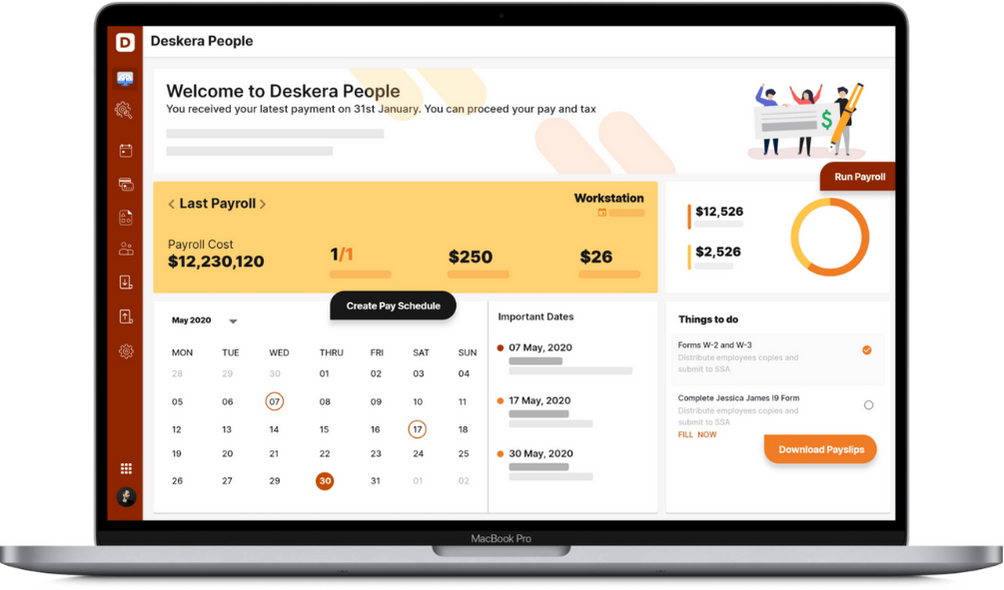Are you a small business that calculates salaries and taxes manually? Employers are exhausted because wages and taxes can cause panic, no matter what method the employer uses, if the employee is waiting for their salary but does not receive it accordingly.
Like salary, withholding is an essential area for employers. The total tax amount calculated can be divided into two categories, so you need to understand the difference between payroll taxes and income tax. Employers can even avoid wage fraud while ensuring employee satisfaction.
If you are a small business, manually calculating taxes can be crippled, but it doesn't have to be. It is advisable to absorb the knowledge regardless of whether you use the software. Payroll taxes and income tax vary greatly depending on the calculation method.
Table of Contents
- What are payroll taxes?
- Payroll taxes tracking
- Louisiana Payroll Tax -What is your state payroll tax obligation?
- How should you register as an employer?
- What are the requirements for tax returns?
- Taxes on unemployment
- Louisiana Salary Laws, Taxes, Regulations
- A step-by-step guide to payroll in Louisiana Processing
- Employer tax on unemployment
- Workers' accident compensation
- Calculate overtime
- Salary method
- Louisiana Salary Deductions
- Employee's final salary
- Louisiana Child Labor Law
- Vacation
- Payroll Taxes Forms
- Conclusion
- How Can Deskera Assist You?
- Key Takeaways
- Related Articles
What are payroll taxes?
The employer must pay multiple taxes when paying the employee. These are known as payroll taxes. Most of the money comes from the employee's wages or salaries, but some are paid by the employer and some are shared.
So what is an employer's payroll tax?
As we have seen, some payroll taxes are deducted from the employer's expense account, not the employee's salary or wages. These are the federal employer's payroll taxes:
- Social security (employer pays half)
- Medicare (employer pays half)
- Unemployment (fully borne by the employer)
There is also a payroll tax for state-level employers. For example, all states impose an unemployment tax. And there's more than that. Consider your employer's payroll tax when budgeting for hiring employees. They are additional costs that exceed salaries and wages.
Payroll taxes tracking
The payroll deduction amount depends on the employee's circumstances, such as Marital status and the amount of money earned over some time. Also, because income tax rates change with income, you can't use spreadsheet formulas to figure out how much you should pay for each payment. For this reason, small businesses with multiple employees often use payroll software to perform their calculations. As a bonus, these types of systems will automatically fill out your tax return and allow you to file it online.
- Regardless of which system you use, be sure to update your employee's payslips regularly. Ask if something has changed every year in W4
- Payroll processing in Louisiana is relatively easy
- Louisiana has only state-specific salary forms and no local taxes. The income tax system is progressive taxation and flat taxation. The more workers earn, the more taxes they pay
Louisiana Payroll Tax -What is your state payroll tax obligation?
Louisiana requires the employer to withhold income tax from the employee's salary in addition to the unemployment tax paid by the employer. The employee fills out Form L4, which is the employee withholding tax exemption certificate used to calculate the withholding tax. Louisiana has no mutual recognition agreements with other states.
Local tax - There is no local income tax in Louisiana.
How should you register as an employer?
Louisiana Employers are required to register with both of the following institutions:
- Louisiana Revenue Department for withholding state income tax from employee wages. Employers can register online with the Louisiana Revenue Department
- The Louisiana Labor Force Commission on Employment Taxes on Unemployment
- Register electronically via the LASTARS online portal
What are the requirements for tax returns?
For Louisiana salaries, you need to submit the following form:
Source of Income:
- The L3 tax return for tax withholding must be submitted by February 27 of each year
- L1 employers file a state income tax withholding declaration quarterly by the last day of the month following the end of the calendar quarter
- L1V retention payment vouchers must be paid semi-monthly, monthly, quarterly, or yearly, depending on your schedule
- Employers can submit and transfer payments electronically via the Louisiana Treasury Taxpayer Access Point (LaTAP) online system
Taxes on unemployment
Form LDOL-ES4 Employer Payroll and Tax Report is due quarterly by the end of the following month at the end of the calendar quarter (April 30, July 31, October 31, and January 31). Employers can file unemployment taxes electronically through the Louisiana Labor Relations Commission's online system.
Louisiana Salary Laws, Taxes, Regulations
To ensure the accuracy of all salaries, it is important to understand how Louisiana payroll taxes are calculated and applicable laws and regulations. With a few exceptions, most US employers are required to pay taxes under the Federal Insurance Contributions Act (FICA). The current FICA tax rate for social security is 6.2% for each employee's salary and 1.45% for Medicare.
- Deduct the amount from everyone's total salary and deposit the corresponding amount from your business bank account
- Louisiana Taxes Louisiana does not collect local taxes, but you are responsible for the state's income and unemployment taxes. It's not exactly a tax, but most employers also need workers' accident compensation
- To calculate, use the state W4 form provided at the time of employment and the Louisiana withholding table. One thing to note is that Louisiana has no tax reciprocity with other states. This means employees who work and pay taxes in Louisiana but live in another or even a nearby state will be paying double tax; to avoid this, you should recommend they complete Louisiana`s Form L4, the Employee Withholding
A step-by-step guide to payroll in Louisiana Processing
Louisiana salaries are not a complicated process, but trying to manually calculate Louisiana payroll tax can result in costly errors. Here are the basic steps for paying a salary in Louisiana:
Step 1: Set up your business as an employer. New businesses may need to upgrade to the Electronic Federal Tax Payment System EFTPS and create New Federal Employer Identification Number (FEIN) to pay federal taxes.
Step 2: Register with Louisiana. If your business is new, you need to register on the Louisiana Secretary of State's website. Companies that pay Louisiana employees must register with the Louisiana Revenue Department.
Step 3: Create a payroll process. You need to decide how often and how to pay your employees (cash and direct deposits and checks). Also, building the system management of how payslips are collected and managed can help you stay organized as you grow.
Step 4: Ask the employee to fill out the relevant form. If your company is hiring new employees, you will need to collect specific payroll forms to comply. All employees must complete the I-9 validation and submit the form within 3 days of the hire date. New employees also need to complete W4. Louisiana also requires employees to fill out the Louisiana Form L4 for state taxes.
Step 5: Review and approve the timesheet. If you have an hourly or part-time employee, you need to track that time. Most small business owners use timesheet templates to create their timesheets or upgrade to timesheet software. In either case, you need to make sure you have enough time to check the accuracy of your employee's timesheets well before the payday and have time to edit and correct any errors as needed.
Step 6: Calculate the employee's total salary and tax. To complete your salary, you need a lot of salaries, starting with the calculation of total working hours and total wages when paying by the hour. It is useful to use a time card calculator. Excel payroll templates or payroll software can also automate this step.
Step 7: Pay employees wages, benefits, and taxes. Most businesses today pay all employees directly by remittance. However, cash and paper checks are also optional. There is no state minimum wage in Louisiana, so be sure to pay your employees at least the state minimum wage of $ 7.25 per hour.
Federal and Louisiana taxes can be paid online. If you use a service provider, you need to work with your service provider to make deductions easily, automatically, and electronically.
Step 8: Save the payslip. Keeping your business record is a good habit. Louisiana law requires businesses to retain the following information for at least one year:
- Each employee's name, address, and job title
- Daily and weekly working hours for each employee
- Wages paid to each employee during each salary period
However, federal law requires you to keep your payslips for at least three years and your payroll tax records for four years.
Step 9: Submit payroll tax to the federal and state governments. All Louisiana taxes must be paid to the appropriate state agency, usually quarterly, according to the schedule provided. This can be done online at the Louisiana Revenue Department website. To pay federal taxes, you can make these payments online using EFTPS in one of two schedules:
- Monthly: If the IRS has a monthly schedule, you will be required to pay payroll tax on payments made during the calendar month by the 15th of the following month
- Semi-Weekly: If the IRS allocates a semi-weekly schedule, the payroll tax will be filed by the next Wednesday for payments on Wednesday, Thursday, and Friday, and by the next Friday for payments on Saturday, Sunday and Monday
Regardless of the payment schedule, taxes must be reported quarterly on Form 941 or annually on Form 944.
Step 10: Fill out the year-end payslip. Every year, you need to fill out a payslip that includes all W2 and 1099 forms. These forms must be available to employees and contractors by January 31st of the following year.
Employer tax on unemployment
All Louisiana businesses are subject to tax under the State Unemployment Tax Act (SUTA). The current wage base is $ 7,700 and rates range from 0.09% to 6.20%. All new employers in Louisiana pay SUTA rates between 1.16% and 2.89%. The employer is also responsible for paying the Federal Unemployment Insurance Tax (FUTA).
This is up to 6% of the first $ 7,000 of each worker's salary. However, if you pay SUTA on time, you will get a discount of up to 5.4% on FUTA and the remaining payment will be 0.6%.
Workers' accident compensation
Companies in Louisiana need to take out workers' accident compensation insurance so that if an employee gets injured or sick at work, or is covered as a result of work at work. However, there are exceptions. If your business falls into one of the following cases, you may not need to purchase workers' accident compensation insurance:
- Your company has no employees (partners or co-owners only)
- They only employ domestic workers or real estate salespeople Louisiana Minimum Wage The Louisiana minimum wage is equivalent to the state minimum wage. The minimum wage was finally raised to $ 7.25 per hour in Louisiana in 2008
Companies are required to pay a minimum of $ 2.13 per hour to employees with a tip as long as the tip meets the minimum hourly wage. If not, you will have to pay the difference.
Calculate overtime
Overtime regulations in Louisiana are subject to the requirements of the Fair Labor Standards Act (FLSA). Under FLSA, all employers must pay workers at least 40 hours a week, 1.5 times their normal hourly wage.
To verify that the overtime calculation is correct, use the overtime calculator. Payment to employees Louisiana law requires employers in four specific industries to pay their employees at least twice a month within 10 days of the end of the payment period. The four industries are:
- Oil and gas
- Mining
- Manufacturing
- Public service
There are no payroll frequency requirements in other industries. This gives other companies the freedom to choose how often they want to pay their employees. However, compliance with federal law requires a consistent rhythm. Louisiana also does not specify a payment method for employees.
If you need to pay your employees immediately and are not currently using the service, use one of the recommended methods to print your salary.
Salary method
No law in Louisiana requires employers to submit regular payslips to their employees. However, we recommend that you provide it anyway. As a best practice, you should include basic employee information (name, job title, working hours, etc.), eligible salary period, salary rate, total salary, withholding tax and other deductions, and final salary.
Louisiana Salary Deductions
Employee wages and salaries can only be deducted to comply with Louisiana salary rules: For clarity, this means that companies in Louisiana cannot deduct from employee salaries for the following reasons:
- Lack of funds
- Required uniforms
- Required tools
- Other items required for employment
Employee's final salary
If an employee is dismissed or retired, within the next normal payday or 15 days from the last day of work You will have to pay the final salary, whichever comes first. It doesn't matter how the split occurred.
- The timing of the employee's last salary payment is the same
- Louisiana Personnel Laws Affecting Salaries
- Louisiana Personnel Laws typically follow federal guidelines
- Reporting New Employees in Louisiana
- All Louisiana employers must report new employees and all rehires to the Louisiana New Employees Directory within 20 days of the date of hire
- It is used to force payment of child support and must include the employee's name, address, and social security number
Meals and Breaks Louisiana does not require businesses to provide breaks for employees over the age of 18. However, the state requires that workers under the age of 18 who plan to work for five consecutive hours must be given an unpaid meal break. The meal break should be at least 30 minutes.
Louisiana Child Labor Law
Children under the age of 14 are not allowed to work in Louisiana. Children aged 14 and 15 may work outside of manufacturing, mining, or other dangerous industries if the following conditions are met:
- Children will not be absent from school
- Children work only 3 hours a day at school or 18 hours a week at school
- Children work only 8 hours on non-school days and 40 hours on non-school weeks
- Except for the required breaks mentioned above, there are no restrictions on children 16 or 17 years old wanting to work
Vacation
In general, Louisiana does not have state-specific vacations or vacation requirements. It offers:
- Family Leave Act
- Family trip in Louisiana
- Paid holiday
- Absence due to vacation
- Paid sick leave
- Optional vacation
- Jury trial leave
- Bereavement leave
Louisiana is subject to the Federal Family and Medical Leave Act (FMLA). Under this law, certain employers give birth / adopt/care for new children, take care of sick families, or perform military duties.
If you have at least 50 employees for at least 20 weeks this year or the previous year, you must comply with them. Louisiana does not offer additional leave under state law, with two exceptions:
Louisiana Pregnancy Disability Leave: If your employer has 25 or more employees, you need to provide women with up to 4 months of unpaid disability leave related to pregnancy, childbirth, or other related medical conditions.
Minor Essentials: Every company doing business in Louisiana must allow up to 16 hours of unpaid leave every 12 months to complete child-related activities that employees cannot schedule outside of work.
Payroll Taxes Forms
Payroll forms can vary from state to state, and some, like Louisiana, have their W4.
- L4: Employee withholding slip Federal salary form Here's a complete list and location of all the required federal payroll forms:
- W4 Form: Provides employee withholding tax information so that federal and state income taxes can be properly calculated and withheld
- W2 Form: Used to report the total annual wage of each employee
- W3 Form: Used to report the total annual wages of all employees
- Form 940: Used to calculate unemployment tax and report it to the IRS
- Form 941: Used for quarterly income tax filing
- Form 944: Used for filing annual income tax
- Form 1099: Provides information about contract work without employees
Conclusion
The final salary in Louisiana is easier than in many states, and applicable laws and regulations usually follow federal guidelines. There is only one country-specific form and no local payroll tax. Louisiana payroll errors can still occur and are costly.
How Can Deskera Assist You?
As a business, you must be diligent with employee leave management. Deskera People allows you to conveniently manage leave, attendance, payroll, and other expenses. Generating payslips for your employees is now easy as the platform also digitizes and automates HR processes.

Key Takeaways
- Payroll taxes and income tax, are quite different from each other
- Calculations and deductions are different. Also, both provide different benefits to workers and should only be retained in two parts
- A slight error in the calculation can cause the company to incur breach charges
- Employers must recognize the differences and calculate accordingly to increase employee satisfaction
Related Articles













